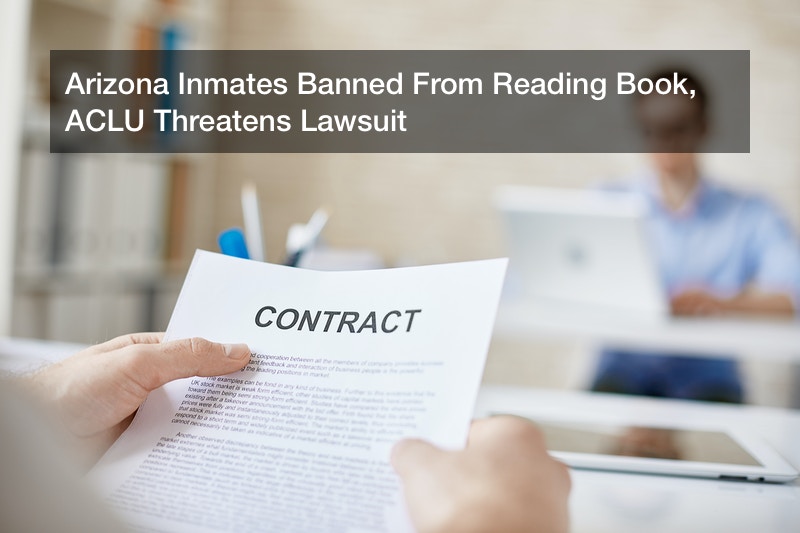Arizona Inmates Banned From Reading Book, ACLU Threatens Lawsuit


With nearly 70 million people documented as having criminal records by the Interstate Identification Index, being locked up is something that a staggering number of Americans have experienced first-hand. In prison, incarcerated individuals don’t have the chance to experience many simple pleasures or basic freedoms. But taking the opportunity to educate oneself and to stimulate the mind through the written word have generally been allowed. Although prison libraries and education programs may be lacking in many facilities, inmates usually have the chance to learn in some capacity. However, the Arizona Department of Corrections has taken extreme steps to bar those incarcerated from reading a particular title that they say would be “detrimental to the safe, secure, and orderly operation” of its prisons. But the American Civil Liberties Union says the book ban itself is breaking the law.
Recent statistics show that Americans read an average of 12 books per year. In the facilities where books are plentiful, those numbers might be much higher. But in Arizona, inmates have been prohibited from reading Paul Butler’s book, “Chokehold: Policing Black Men,” during their incarceration. Butler, who was a federal prosecutor before his foray into the literary world (an act prompted by his arrest for false assault allegations), serves as a guide for African American men who find themselves as victims of the criminal justice system. The chokehold move, which is typically used by law enforcement to subdue individuals, becomes a convenient metaphor for racial oppression in the American criminal justice system. Butler details the techniques currently used to facilitate reform and maintains that prisons are nothing more than a means to promote modern-day slavery. And while Butler outlines the rights of the individual during common law enforcement-related situations, he’s careful to stress that violence against police officers or any other individuals would be unjustified and wrong.
Still, the Arizona Department of Corrections has banned the book from all state facilities — a move that has prompted ACLU to file a lawsuit in outrage. The ban, ACLU says, is a violation of First Amendment rights.
In a letter addressed to Corrections Director Charles Ryan, ACLU attorney Emerson Sykes wrote: “The very people who experience extreme racial disparity in incarceration cannot be prohibited from reading a book whose purpose is to examine and educate about that disparity… To prohibit prisoners from reading a book about race and the criminal legal system is not only misguided and harmful, but also violates the right to free speech under the First Amendment of the US. Constitution and … the Arizona Constitution.”
“Under certain circumstances,” wrote Sykes, “it is permissible to prevent incarcerated people from reading materials of their choosing. However, it is unconstitutional to censor a book that educates prisoners on how legal, penal, and other institutions have shaped their own lives and poses no threat to the safety and security of the facility.”
Not only did Sykes refer to the ban as “fundamentally flawed… given Arizona’s stark racial disparities in and overall high rates of incarceration,” but ACLU has demanded that corrections officials overturn the ban on “Chokehold” immediately. What’s more, they called for a review of the department’s reading material policy “to ensure continued respect for the First Amendment rights of incarcerated persons.” Should ADC not comply, ACLU will consider litigation to make things right.
Supreme Court rulings established that incarcerated individuals maintain the right to read literature; any restriction on those rights must be proven to be closely related to the legitimate interests of the prison. Because the Arizona Department of Corrections cannot provide evidence to show that banning the book in question is directly related to operational or safety concerns within the state’s prison system, ACLU argues that access to the book should be restored. What’s more, the Supreme Court has prohibited literary restrictions that represent an “exaggerated response” from prison officials in the past.
According to ACLU, this isn’t the first time the state’s department of corrections has circumvented the constitutional rights of Arizona inmates in relation to the access of educational materials. Only a few months ago, a federal court ruled that ADC’s ban on written and visual depictions of sexual acts violated the First Amendment because the ban was “not rationally related to its stated goals of rehabilitation, reduction of sexual harassment, and prison security.” The censored material in question actually addressed allegations of sexual harassment and prison assault — which could have provided inmates with the information they needed to understand their rights and promote safety within a given facility.
Banned books aren’t only an Arizona issue, either. In one Georgia facility, a sheriff imposed a ban on all reading materials apart from religious texts. Michelle Alexander’s “The New Jim Crow,” a book that explores the racism present within mass incarceration, has been banned in North Carolina and Florida. And in Washington state, a policy was enacted to keep outsiders from sending free books to inmates (a policy that was rescinded after massive outrage). While banning certain reading materials that might present a threat to staff or inmates might be valid, it’s clear that many of these regulations are put into place to control through unlawful means. By keeping the incarcerated massed uneducated, this takes away what little power these inmates have — and experts say it seems like that’s exactly what law enforcement wants.
